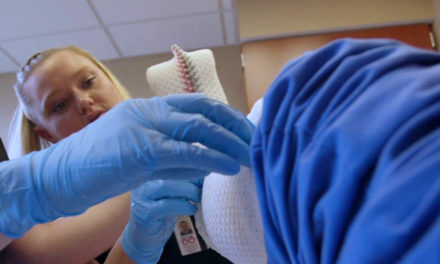April marks the beginning of Occupational Therapy (OT) month, providing the perfect time to debunk a few myths about OT treatments and services that have developed overtime.
Have you ever believed any of the following misconceptions about an occupational therapy program?
Physical therapy and occupational therapy are the same.
Perhaps the most common misconception — physical and occupational therapy are actually two separate, distinct parts that contribute to a full state of well-being.
OT programs assess any medical issues that might hold a patient back from participating in the activities of daily life. These conditions may cover developmental or learning disabilities, traumatic injuries, psychological disorders, and more.
Meanwhile, physical therapists conduct rehabilitation that helps a patient regain full use and movement of their body.
Occupational therapists only work with the elderly.
Though occupational therapists certainly provide a long list of services that benefit the senior population, occupational therapy isn’t just for the elderly.
Occupational therapists care for a diverse patient population, based on its rehabilitation needs. They often work in different settings that range from job site evaluations to the classroom, helping children with developmental disorders function in school.
Find an Occupational Therapist Near You
Call (716) 706-2112
Occupational therapy is repetitive — it never evolves.
On the contrary — one of the benefits of occupational therapy is how the treatment meets you wherever you are, in light of your natural capabilities or recent events.
Occupational therapists do not recommend repetitive activities, but rather work to create customized programs that grow with you as you make progress or as your condition changes.
Only those who work physically-demanding jobs require occupational therapy programs.
The variation of the word “occupation” is somewhat misleading. Occupational therapists don’t exclusively care for patients dealing with job-related disabilities.
Instead, occupational therapy provides a responsive type of treatment that assists you in a return to your level of “normal” and the routines that make up everyday life.
Occupational therapists are only concerned with my physical health.
Occupational therapists are really an invaluable resource, because of their focus on your health and wellness as a whole. They deal directly with patients who are living with conditions that reduce their ability to function, which often causes the onset behavioral health concerns, like anxiety and depression.
You may feel your mood change or stress levels rise as you work to perform routine skills that used to seem uncomplicated. Experienced occupational therapists will help you learn coping methods and provide support to help you adjust to this change in lifestyle.
April marks the beginning of Occupational Therapy (OT) month, providing the perfect time to debunk a few myths about OT treatments and services that have developed overtime.
Have you ever believed any of the following misconceptions about an occupational therapy program?
Physical therapy and occupational therapy are the same.
Perhaps the most common misconception — physical and occupational therapy are actually two separate, distinct parts that contribute to a full state of well-being.
OT programs assess any medical issues that might hold a patient back from participating in the activities of daily life. These conditions cover developmental or learning disabilities, traumatic injuries, psychological disorders, and more.
Meanwhile, physical therapists conduct rehabilitation that helps a patient regain full use and movement of their body.
Occupational therapists only work with the elderly.
Though occupational therapists certainly provide a long list of services that benefit the senior population, occupational therapy isn’t just for the elderly.
Occupational therapists care for a diverse patient population, based on its rehabilitation needs. They often work in different settings that range from job site evaluations to the classroom, helping children with developmental disorders function in school.
Find an Occupational Therapist Near You
Call (716) 706-2112
Occupational therapy is repetitive — it never evolves.
On the contrary — one of the benefits of occupational therapy is how the treatment meets you wherever you are, in light of your natural capabilities or recent events.
Occupational therapists do not recommend repetitive activities, but rather work to create customized programs that grow with you as you make progress or as your condition changes.
Only those who work physically-demanding jobs require occupational therapy programs.
The variation of the word “occupation” is somewhat misleading. Occupational therapists don’t exclusively care for patients dealing with job-related disabilities.
Instead, occupational therapy provides a responsive type of treatment that assists you in a return to your level of “normal” and the routines that make up everyday life.
Occupational therapists are only concerned with my physical health.
Occupational therapists are really an invaluable resource, because of their focus on your health and wellness as a whole. They deal directly with patients who are living with conditions that reduce their ability to function, which often causes the onset behavioral health concerns, like anxiety and depression.
You may feel your mood change or stress levels rise as you work to perform routine skills that used to seem uncomplicated. Experienced occupational therapists will help you learn coping methods and provide support to help you adjust to this change in lifestyle.





